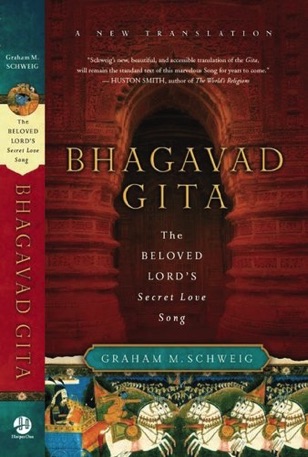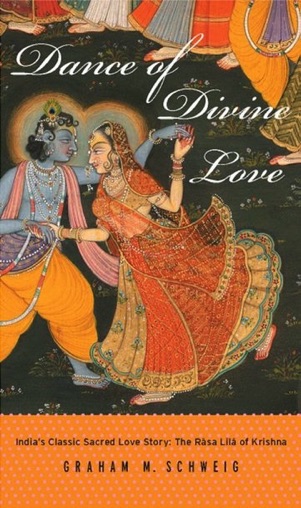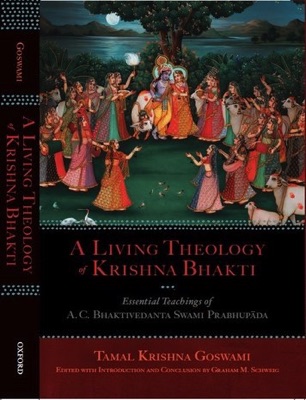Books

BHAGAVAD GĪTĀ
The Beloved Lord’s Secret Love Song
by Graham M. Schweig
Published by Harper Collins / Harper One, 2010
The Bhagavad Gītā is often regarded as the Bible of India.
With a gripping story and deeply compelling message, it is unquestionably one of the most popular sacred texts of Asia and, along with the Bible and the Qur’ān, one of the most important holy scriptures in the world.
Part of an ancient Hindu epic poem, the dialogue of the Bhagavad Gītā takes place on a battlefield, where a war for the possession of a North Indian kingdom is about to ensue between two noble families related by blood. The epic’s hero, young Prince Arjuna, is torn between his duty as a warrior and his revulsion at the thought of his brothers and cousins killing each other over control of the realm. Frozen by this ethical dilemma, he debates the big questions of life and death with the supreme Hindu deity Krishna, cleverly disguised as his charioteer.
By the end of the story, Eastern beliefs about mortality and reincarnation, the vision and practice of yoga, the Indian social order and its responsibilities, family loyalty, spiritual knowledge, and the loftiest pursuits of the human heart are explored in depth. Explaining the very purpose of life and existence, this classic has stood the test of twenty-three centuries. It is presented here in a thoroughly accurate, illuminating, and beautiful translation that is sure to become the standard for our day.
DANCE OF DIVINE LOVE
The Rāsa Līlā of Krishna from the Bhāgavata Purāṇa India’s Classic Sacred Love Story
by Graham M. Schweig
Published by Princeton University Press, 2005
Dance of Divine Love presents India’s classical sacred love story known as the Rasa Lila. It is a dramatic poem about young maidens joining with their ideal beloved to perform the wondrous “circle dance of love”, or Rasa. Its story is an expression of the eternal soul’s loving union with the supreme deity in “divine play”, or Lila. The Rasa Lila is considered the ultimate message of one of India’s most treasured scriptures, the Bhagavat Purana.
The narrator of this story tells us that the highest devotional love for God is attained when hearing or reciting the Rasa Lila. Undeniably, its charming poetic imagery, combined with deeply resonating devotional motifs, expresses to any reader much about the nature of love. Narrated in eloquently rich and flowing Sanskri verse, it has been recognized as one of the most beautiful love poems ever written.
A fascinating study and eloquent translation of the beloved story of the all-attractive god Krishna’s nocturnal dalliances with the cowherder women of Vraja as described in the Bhagavata Purana. . . . Schweig render[s] this Sanskrit classic into elegant English.
Joel Bordeaux, Altar Magazine
This is the most complete presentation of the Rasa Lila, focusing on the text and story itself and looking at it, as it requires, from each of its many viewpoints. The scholarship and teaching quality are first-rate. . . . Schweig’s approach is inclusive, consciously reaching out to all levels of reader/devotee/connoisseur and clearly wishing not to leave anyone behind. . . . [E]veryone interested in Hinduism, literature, and religion should consider buying this book.
James D. Redington, S.J., Journal of Vaishnava Studies
A LIVING THEOLOGY OF KRISHNA BHAKTI
Essential Teachings of A. C. Bhaktivedanta Swami Prabhupāda
by Tamal Krishna Goswami
Edited with Introduction and Conclusion by Graham M. Schweig
Published by Oxford University Press, 2012
A. C. Bhaktivedanta Swami Prabhupāda (1896-1977), founder of the Hare Krishna Movement, traced his lineage to the fifteenth-century Indian saint Sri Chaitanya. He authored more than fifty volumes of English translation and commentaries on Sanskrit and Bengali texts, serving as a medium between these distant authorities and his modern Western readership and using his writings as blueprints for spiritual change and a revolution in consciousness. He had to speak the language of a people vastly disparate from the original recipients of his tradition’s scriptures without compromising fidelity to the tradition.
Tamal Krishna Goswami claims that the social scientific, philosophical, and ‘insider’ forms of investigation previously applied have failed to explain the presence of a powerful interpretative device–a mahāvākya or ‘great utterance’–that governs and pervades Prabhupāda’s ‘living theology’ of devotion on bhakti. For Prabhupāda, the wide range of ‘vedic’ subject matter is governed by the axiomatic truth: Krishna is the Supreme Personality of Godhead.
Goswami’s academic training at the University of Cambridge, his thirty years’ experience as a practitioner and teacher, and his extensive interactions with Prabhupada as both personal secretary and managerial representative, afforded him a unique opportunity to understand and illuminate the theological contribution of Prabhupada. In this work, Goswami proves that the voice of the scholar-practitioner can be intimately connected with his tradition while sustaining a mature critical stance relative to his subject. A Living Theology of Krishna Bhakti includes a critical introduction and conclusion by Graham M. Schweig.
BHAGAVAD GĪTĀ CONCORDANCE
A Comprehensive Word Reference with English and Sanskrit Indexes
by Graham Schweig

“Graham M. Schweig’s Bhagavad Gītā Concordance is the best work of its kind for all of Sanskrit literature. It is comprehensive, precise, and astonishingly user-friendly. No future translation of the Gītā or scholarly study of its language, philosophy, or theology can proceed without consulting this concordance.”
— Ariel Glucklich, professor and chair of theology and religious studies, Georgetown University
“Bhagavad Gītā Concordance fills a major lacuna in scholarship and will become a standard reference book and resource for millions of scholars and practitioners. Graham Schweig’s translation of the Bhagavad Gītāis a masterpiece, and this concordance is impeccably done.”
— Gopal K. Gupta, author of Māyā in the Bhāgavata Purāṇa: Human Suffering and Divine Play
“Schweig’s comprehensive and utterly useful concordance of the Bhagavad Gītā is astonishingly the first of its kind, even though there have been other related reference works that precede it. Recollecting even a single word, phrase, or idea from the Gītā―a monumental and oft-memorized work of Indian philosophy and culture―both the scholarly and general reader can now easily consult this concordance to bountiful results.”
— Deven M. Patel, author of Text to Tradition: The Naiṣadhīyacarita and Literary Community in South Asia
“The Bhagavad Gītāserves as the gateway for understanding the core principles and practices of Hindu Yoga. This remarkable concordance serves at least two purposes. First, it allows one to navigate all the complex and well chosen terms that define key ideas in the text. Second, it helps broaden one’s grasp of the Sanskrit language, tracing the root origins of words and their many derivations. This book is essential for all university libraries and for all intermediate Sanskrit seminars.”
— Christopher Key Chapple, Doshi Professor of Indic and Comparative Theology, Loyola Marymount University
“Graham Schweig has lovingly and comprehensively put together the ultimate concordance of the Bhagavad Gītā. It is not just a list of words and other lexical items that are easily located in the main text, but the volume also includes several useful appendices of themes, Sanskrit-English and English-Sanskrit vocabulary along with four well-received translations of the Sanskrit-English vocabulary, a list of Sanskrit nominal stems and verbal roots, and the entire text in Roman transcription. This is an indispensable resource for students and lay readers who seek a better grasp of this supremely important Indian text.” — Frederick M. Smith, professor emeritus of Sanskrit and classical Indian religions, University of Iowa
POSTHUMOUS EDITING OF A GREAT MASTER’S WORK
Special Focus on the Writings of A. C. Bhaktivedanta Swami Prabhupāda

Edited by Graham M. Schweig
Contributions by Edith Best; Jonathan Edelmann; Joseph Fedorowsky; Austin Gordon; Michael Gressett; Barbara A. Holdrege; Allan M. Keislar; Anna S. King; Julius Lipner; Jeffery D. Long; Kenneth Rose and Graham M. Schweig
“Rarely does an academic work speak with such urgency and clarity to an issue that concerns millions of readers around the world. This book is a work of interdisciplinary scholarship that brings together theologians, historians, educators, an attorney, as well as practitioners and scholars of religion, to shed light on the extensive and unwarranted editing of the works of A.C. Bhaktivedanta Swami Prabhupada by the Bhaktivedanta Book Trust.”
— Abeer Saha, Curator, National Museum of American History, Smithsonian Institution
“Śrīla Prabhupāda was one of the more significant Indians to bring Hindu devotional thought and practice to the west in the 1960s and 70s. Since that time, ISKCON–the organization he founded–has spread all over the world as have many of his teachings. The topic of the present volume then, deals with issues that are not only important to Prabhupāda’s followers but to scholars and lay people interested in his approach to Krishna devotion in the Hindu Tradition. Like several of the contributors to the volume, I am not a member of his organization, although I met with Prabhupāda on several occasions and have read many of his writings. In addition, I participated in the conference at GTU in 2020 that generated many of the chapters herein. Each of these bring light to the discussion of the dynamics of translating and editing the work of significant authors as well as of one’s own spiritual teacher. Several mention the principle of arsa-prayoga, which is generally understood to mean that the quality and wisdom of a spiritual teacher’s words can outweigh whatever grammatical errors he/she might make. In some form or another, this concept of accepting their guru’s words just as they have been spoken tends to be adhered to by many followers of Hindu teachers as a way of showing deference and respect. This appears to be the case with many of the contributors to this volume as they adopt and apply this principle to the transcribed versions of Prabhupāda’s writings. In doing so, they display sound and rational thought in the process of expressing both their understandings of the issue as well as their devotion. Although the volume is an important contribution to the specific situation being discussed, it also provides the reader a broader perspective on the difficulties that can and do arise when attempting to “edit” the words of a posthumous author of respect.”
— Ramdas Lamb, University of Hawai’i at Manoa
“The status of a spiritual mission, including the words of the founder, may be judged by the quality of academic debate that ensues in its aftermath. The international success of ISKCON and the writings of His Divine Grace A. C. Bhaktivedanta Swami Prabhupada (1896-1977) are at the forefront of the wave of Indian spirituality that changed the way the entire world thought about theistic Hinduism and Bhakti devotion to Krishna. And while the essential message may remain strong among the devotees, I applaud Graham Schweig and the contributors of this engaging volume for bringing to light many of the scholastic issues involved in the ongoing republication of Prabhupada’s written teachings and am confident it will generate valuable insight into sacred texts and the literary experience of the Holy.”
— Guy L. Beck, Tulane University Asian Studies


